Epiphany personal reflective
advertisement
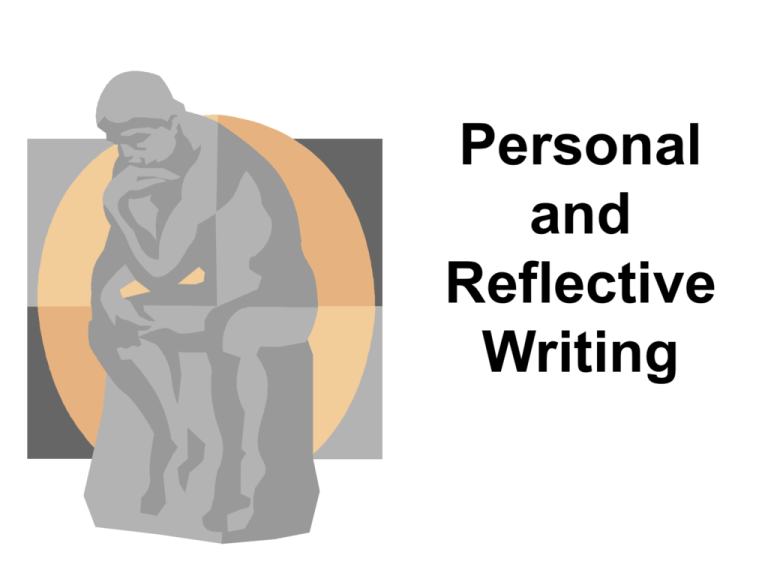
Personal and Reflective Writing What is it? Personal About you About your experiences About your thoughts, feelings, opinions, ideas… Reveals your character, personality and thought processes What is it? Reflection Characterised by quiet thought or contemplation To Reflect To think, meditate or ponder Think about a mirror – mirrors reflect. They allow you to look back at yourself and consider your appearance. Thoughtful reflection will allow you to consider yourself or an incident and examine it in detail. Main Requirements • The essay will aim to interest or give pleasure, rather than simply convey information. • It will concern itself with, usually, a single idea, insight or experience. • Be thoughtful in tone and convey a sense of the writer’s personality, authorial voice & stance. • Reveal the thought processes of the writer and engage the reader in the writer’s process of reflection An Reflective essay is NOT simply an account of an experience. It must contain thoughtful reflection and be entertaining for the reader. Summary • Take a single personal experience, idea or insight as a starting point or stimulus • Show writer’s interesting and/or entertaining thoughts on this central stimulus • Develop thoughts and move out beyond immediate starting point to REFLECT in wider way on some aspect(s) of the experience, idea or insight. • Something of writer’s personality will emerge from this process of reflection. Process • Pick an initial stimulus. • Explore initial stimulus in an interesting and entertaining way. • Move out and beyond initial stimulus to establish a thoughtful tone. • Reveal aspects of the writer’s personality and thought processes. Reflective Writing is still CREATIVE • Use your style and specific literary techniques to create interest and effect within your essay: IMAGERY Word Choice Alliteration Sentencing Hyperbole Onomatopoeia Use of the senses Symbolism Punctuation All Reflective essays should focus on some aspect of this What is it? The main focus of reflection should ultimately make some sort of point about how we live – what makes us tick You should try to explore it in a unique and new way The human condition is about how we live our lives and how human nature works It can be concerned with positive or negative aspects – how we behave, obstacles or challenges we encounter, how we react Your Task Choose an occasion when you had a moment of epiphany or made a sudden discovery or realisation. Describe this moment and reflect on its significance in your life. What is an Epiphany DEFINITION: A sudden realization about the nature or meaning of something. An epiphany can often come about due to some experience that may trigger the sudden realization. • Derived from the Greek word “epiphaneia”, epiphany means “appearance” or “manifestation. • In literary terms, an epiphany is that a moment in the story where a character achieves realization, awareness or feeling of knowledge after which events are seen through the prism of this new light in the story. • James Joyce, the great Irish writer used this term in his writings to indicate the sudden eye-opener regarding the nature of a person or situation. • Even insignificant things in our life can suddenly inspire in us an awareness that can change our lives for good. • Seeing something in a new light. • Seeing something from a new or different perspective. • When the penny drops. An Example Let us consider an epiphany of a smoker: • “I used to smoke a lot. Everyone let me know that it was bad for my health however, I didn’t pay any notice. One day I saw my two years of age offspring trying for a used cigarette within an ashtray. Seeing this, abruptly it dawned upon me how terrible smoking was and I stopped smoking.” So, this sudden feeling of knowledge brings to light what was so far hidden and it changes one’s life is called epiphany. • Consider a person of your age. What sorts of ‘epiphanies’ or moments of realisation might they have had throughout their life? We Are Not Real! Planning • Make a list of potential ‘experiences’ in which there was a moment of ‘epiphany’ or realisation. • For each one, note down: – What you ‘learned’ about yourself and your own life – What you ‘learned’ about the way we (as humans) live or about wider society/the world Structure • Opening/Introduction This should engage your reader with the topic in a subtle way, without giving too much away. You Could: - Explore the notion of epiphanies - ‘Paint a picture’ of the moment of epiphany – what it feels like (don’t give away exactly what it is yet) - Begin describing the setting/scene of the ‘experience’ (again, don’t tell us exactly what it is yet) Examples: The younger we are, the more we think we know but as we grow, so too does our world. Life goes from being simply black and white to suddenly exploding in exponentially increasing shades of colour. Whether it’s ‘sun blush red’ or ‘my granny’s front door green’, we soon begin to realise that life is about discoveries, and in making those discoveries, we are forced to continually re-evaluate what we thought we once knew about the world around us. Not all these ‘discoveries’ are pleasant: some shatter the very foundations on which our lives once sat and, in allowing us to understand more about the world, also somehow manage to steal something precious away; something which can only be momentarily remembered when fleetingly recognised in the innocent eyes of someone younger than ourselves. One such ‘theft’ happened to me when I was only six years old and I pushed open the living room door to be met by my father merrily munching into a mince pie. Examples: The most vivid memory I have of my early childhood is of a flood of intense pain washing through me. However, it is not the memory of the pain that haunts me to this very day, there was something else that swept into me and remained stagnant within, ready to bubble up and pull me under with it if I ever ventured near a set of precarious stairs again. Lying on the ground in a broken heap, I could suddenly understand why my mum had always tried to spoil my fun and stop me from exploring the world around me at anything higher than ground level. Structure • Main Body In the main body you will have to describe the experience You will then use it as a starting point to show and reflect on your thought processes throughout the ‘discovery’ This will lead on to what it taught you about yourself and life in general. You should include/cover: • What things were like before the ‘discovery/epiphany’ e.g. naivety, blissful ignorance, sense of security etc. • Description of the immediate build up to the experience • Description of the ‘experience’ – remembering vivid, engaging descriptions, use of style • Thoughts and feelings during the experience and moment of ‘epiphany’ – again, try to describe this as vividly as you can • Description of the immediate aftermath – how you felt, what the incident made you begin thinking about/reflecting on • Your wider reflections about the incident – what the ‘discovery’ had made you consider and what it taught you about yourself and wider life in general (The HUMAN CONDITION) Structure • Conclusion This should round of your reflection in an interesting way, leaving the reader with the main focus of your reflection and how you feel about the ‘epiphany’ now – or the nature of epiphanies in general. You Could: - Revisit an idea or example from the opening and make a final reflective comment on it - Consider how you feel about the ‘epiphany’ now, looking back at it with ’wiser’ eyes - Reflect on what you learned and why the moment is still a significant/important part of your life (Rites of Passage) – do you anticipate other such ‘epiphanies’ in your future Deadline Date • Monday 11th November 2013 • Ensure essay is typed, correctly formatted and printed out, ready to submit during the lesson • Word count: 500-1000 words
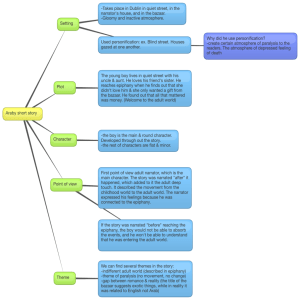
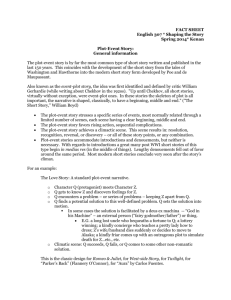
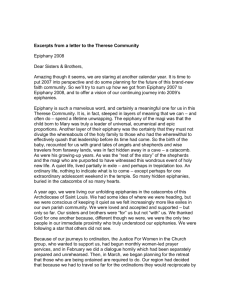
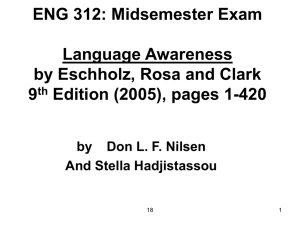
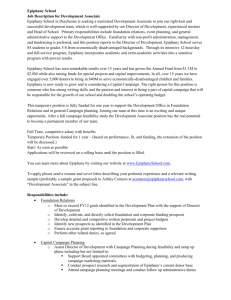
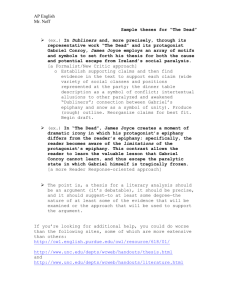
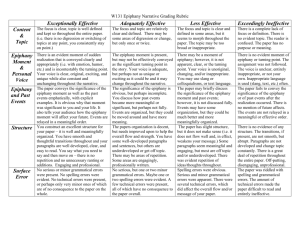
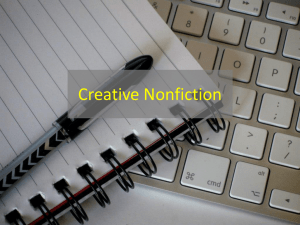
![Most Commonly used Prefixes [9]](http://s3.studylib.net/store/data/008416233_1-12452291afb73e737e1e0672adde05cc-300x300.png)